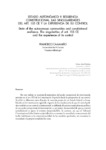Estado autonómico y resiliencia constitucional: las singularidades del art. 155 CE y la experiencia de su control

View/
Use this link to cite
http://hdl.handle.net/2183/27367
Except where otherwise noted, this item's license is described as Creative Commons Reconocimiento-NoComercial-SinObraDerivada 4.0 España (CC BY-NC-ND 4.0 ES), pasado un año desde su publicación
Collections
- Investigación (FDER) [672]
Metadata
Show full item recordTitle
Estado autonómico y resiliencia constitucional: las singularidades del art. 155 CE y la experiencia de su controlAlternative Title(s)
State of the autonomous communities and constitutional resilience: The singularities of art. 155 CE and the experience of its controlAuthor(s)
Date
2020-12-21Citation
Caamaño, F. (2020). Estado autonómico y resiliencia constitucional. Las singularidades del art. 155 CE y la experiencia de su control. Revista Española de Derecho Constitucional, 120, 289-312. doi: https://doi.org/10.18042/cepc/redc.120.10
Abstract
[Resumen] En este trabajo se examina la naturaleza del poder excepcional de intervención previsto en el art. 155 de la Constitución Española desde la perspectiva de su control. A tal fin se diferencia entre el poder de coerción propio de un Estado federal y el establecido en la Constitución española. A partir de la consideración de que el control político también es un control constitucional, se defiende el carácter esencialmente político de ese poder excepcional de intervención, y, por tanto, la necesidad de que su control jurisdiccional se ajuste al mínimo imprescindible. Se sostiene, así, que el Tribunal Constitucional debe limitar su jurisdicción a constatar la necesidad y concurrencia del hecho habilitante y la constitucionalidad de las medidas aprobadas, sin examinar la necesidad o la proporcionalidad de estas. [Abstract] This work examines the nature of the exceptional power of intervention regulated in art. 155 of the Spanish Constitution from the perspective of its control. To do this, a distinction is made between the coercive power of a federal state and that established in the Spanish Constitution. Starting from the consideration that political control is also a constitutional control, the essentially political character of this exceptional power of intervention is defended, and, therefore, the need for its jurisdictional control to be the minimum necessary. In this way, it is maintained that the Constitutional Court must limit its jurisdiction to establish the necessity and concurrence of the determining fact and the constitutionality of the approved measures, without examining the necessity or the proportionality of the same.
Keywords
Derecho excepcional
Coerción federal
Estado autonómico
Resiliencia constitucional
Control político
Autocontención judicial
Exceptional law
Federal coercion
State of autonomous communities
Constitutional resiliencie
Political control
Judicial self-restraint
Coerción federal
Estado autonómico
Resiliencia constitucional
Control político
Autocontención judicial
Exceptional law
Federal coercion
State of autonomous communities
Constitutional resiliencie
Political control
Judicial self-restraint
Editor version
Rights
Creative Commons Reconocimiento-NoComercial-SinObraDerivada 4.0 España (CC BY-NC-ND 4.0 ES), pasado un año desde su publicación
ISSN
0211-5743






